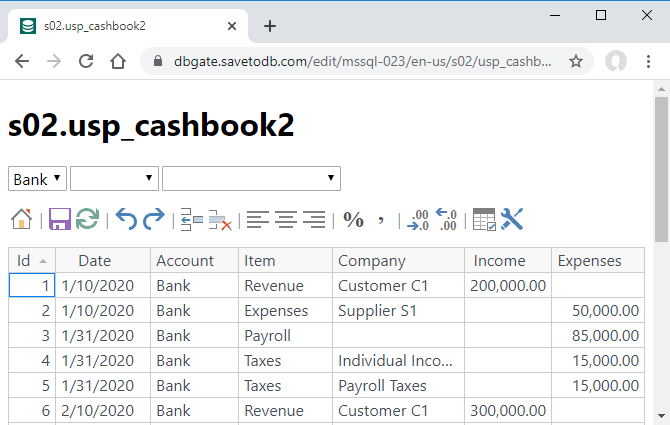Getting Started with DBGate for Web-Based Database Management
DBGate is a cross-platform application that enables you to view and edit database data directly in your browser.
The server-side ASP.NET Core application implements a REST service that provides the following functionalities:
- Retrieve data from tables and views via GET requests.
- Execute stored procedures that return data via GET requests.
- Insert, update, and delete data from tables and views using POST, PUT, and DELETE requests.
- Execute stored procedures that modify data using POST, PUT, and DELETE requests.
To create a service, simply add a named connection string to the application settings.
DBGate automatically generates a model for all available tables, views, and stored procedures by reading the database metadata.
It supports SQL Server, Oracle Database, MySQL, MariaDB, and PostgreSQL on both Windows and Linux.
For example, a service configured with the mssql-023 connection string will have URLs like these:
- https://dbgate.savetodb.com/api/mssql-023/
- https://dbgate.savetodb.com/api/mssql-023/cashbook
- https://dbgate.savetodb.com/api/mssql-023/usp_cashbook
DBGate also includes a JavaScript client accessible at the /edit/ endpoint, with URLs such as:
- https://dbgate.savetodb.com/edit/mssql-023/
- https://dbgate.savetodb.com/edit/mssql-023/cashbook
- https://dbgate.savetodb.com/edit/mssql-023/usp_cashbook
Here’s a sample screenshot of the client:

You can load data from tables, views, and stored procedures, edit it, and save your changes.
We believe that DBGate revolutionizes in-house application development by allowing you to create well-designed databases that can effectively deliver corporate web applications.
You can achieve quick results. Check out these articles:
Database developers can customize API models and JavaScript client features. For more details, see: